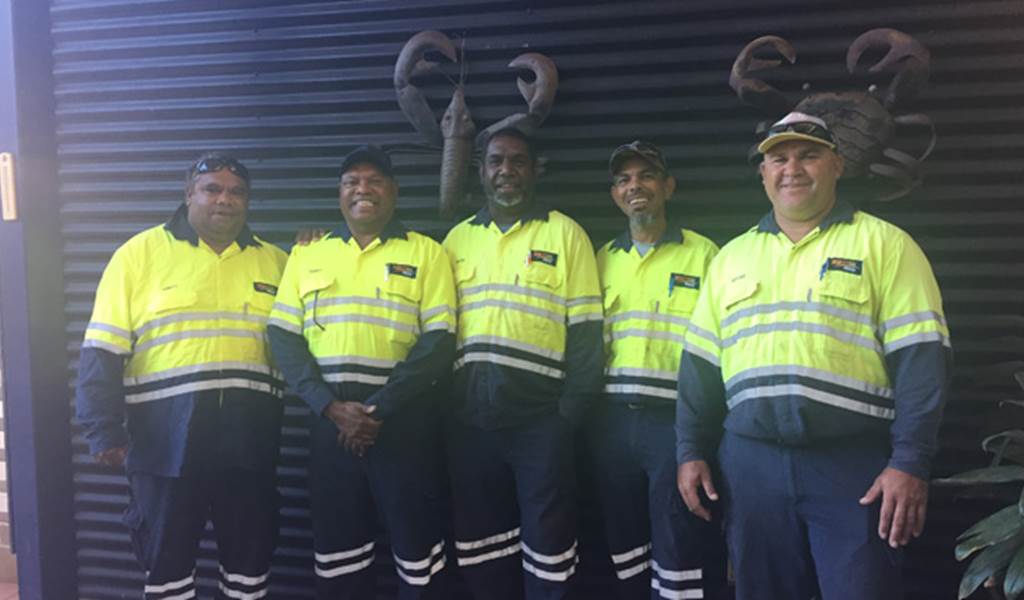
Four men from some of the most remote Aboriginal communities in Western Australia have just become the first people to complete a unique national apprenticeship created by Horizon Power to improve outcomes in remote communities.
Keith Hunter, of Bidyadanga, Clinton (Minty) Sahanna who covers the Dampier Peninsula communities of Beagle Bay, Lombadina/Djarindjin and Ardyaloon, Robert Hassett, of Kalumburu and Brendan Walters, of Yungngora are Australia’s first Remote Community Utilities Workers (RCUWs).
They live and work in their communities, maintaining electrical networks and, in Kalumburu and Yungngora, maintain the power stations.
The four men are the pioneers of this unique trade and have worked alongside Horizon Power in the development of the training program. Work on the development of the program began in 2008.
It has been a long journey for the four men and today they were awarded with their trade certificates and statements of attainment in the Certificate III Electricity Supply Industry (ESI) Remote Community Utilties Worker (RCUW) qualification, marking the end to their apprenticeships.
Minty Sahanna received his trade certificate at Horizon Power’s Broome office yesterday. “It benefits Indigenous people who live in their community to have a sense of pride and achievement. It’s great that the team and I are recognised for the time and effort we all put in with a nationally registered qualification.”
Before the apprenticeship program began, it could take a day for crews based in Kununurra just to get to towns like Kalumburu if there was a power outage and even longer during the wet season.
Horizon Power Managing Director Frank Tudor said the trade qualification was unique to Western Australia and he was very proud of the first four graduates, for achieving their significant goals and of the business for establishing the program.
He said the RCUW trade qualification was designed to improve the reliability of power supplies in remote Aboriginal communities, and reduce the duration of outages but importantly to also create jobs and boost the economic development and sustainability of these regional communities.
“The four RCUWs were the pioneers of this work and were actually involved in the development of the training to ensure it met the unique needs of remote communities and, critically, safety requirements given the requirement to work alone.”
“Importantly, they have also served as role models for the young people in their community and are on hand to assist their community with issues relating to their power,” he said.
“Horizon Power services remote and regional WA through a decentralised model and we live and work in our communities – it doesn’t matter if those communities are hundreds of kilometres from the nearest town.”
While planning for the program started back in 2007, the training did not begin in earnest until 2009 and the four team members had to brush up their maths skills in order to undertake the trade qualification, which is most similar to that of an electricial distribution lineworker.
The State Training Board on behalf of the WA Government registered the National Certificate III Remote Community Utilities Worker (RCUW) trade qualification as a Class A Apprenticeship in September 2016.
In 2009, the then Aboriginal Communities Training program, from which this qualification evolved, was awarded two WA Premier’s Award for “Improving Government” and “Innovation” and an Australian Business Award for “Community Contribution”.
Three years later in 2012, it achieved national trade recognition which means it can be adopted by other electricity utilities and companies throughout Australia who operate in remote communities.
Mr Tudor said Horizon Power provided a regularised electricity service to more than 40 remote and town-based Aboriginal communities throughout the Kimberley, Pilbara and Mid West regions.
“We are working closely with the State Government in the hope we will be able to improve the maintenance and quality of electrical infrastructure in more Aboriginal communities in regional WA and to work with communities to provide further training and employment opportunities where possible,” Mr Tudor said.
“We would love to build on this important work and provide more job opportunities for Aboriginal people in communities to ensure a sustainable future,” Mr Tudor said.
“I am extremely proud today of what we have achieved with this program but more importantly, what Clinton, Keith, Brendan and Robert have achieved by becoming the first ever remote community utilities workers,” he said.
Fact file
- Horizon Power has begun an important piece of work to identify future skills required in the business as the energy industry undergoes a significant transformation and there is a shift away from the traditional delivery of energy. This is expected to lead to future training positions.
- Adult apprenticeship opportunities will soon be available to Pilbara lineworkers. The cable jointing apprenticeships will enable existing lineworkers, who have constructed and maintained overhead networks, to transition their skills to the specific requirements of an undergrounded network.
- Horizon Power collaborates with the Chamber of Commerce and Industry of WA to offer work placements for engineering graduates and is exploring ways to expand this program to engineering undergraduates and students in other fields such as industrial relations.
For more information,
Please contact Wendy Pryer 0409 796 999 or 1800 799 745.
Pictured above: From left to right: Clinton ‘Minty’ Sahanna, Terry Shadforth , Keith Hunter, Robert Hassett, Brendan “Koomi” Walters.